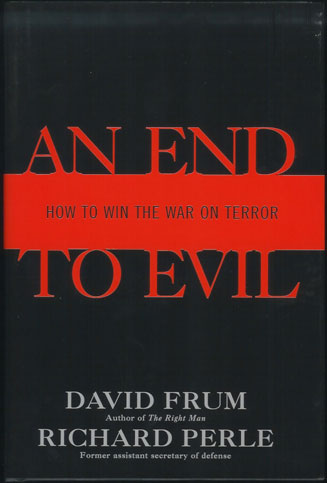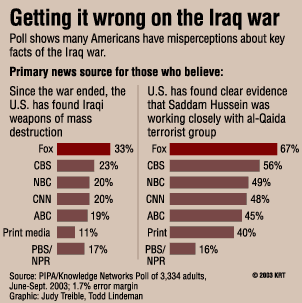| White House misused Iraq intelligence... |
|---|
| "Official intelligence on Iraqi weapons programs was flawed, but even with its flaws, it was not what led to the war," Pillar wrote in the upcoming issue of the journal Foreign Affairs. Instead, he asserted, the administration "went to war without requesting -- and evidently without being influenced by -- any strategic-level intelligence assessments on any aspect of Iraq." |
| Leaked Downing Street Memo Verifies Bush's Pre-War Deception |
|---|
| Bush wanted to remove Saddam, through military action, justified by the conjunction of terrorism and WMD. But the intelligence and facts were being fixed around the policy. The NSC had no patience with the UN route, and no enthusiasm for publishing material on the Iraqi regime's record. |
| Exclusive: Bush Wanted To Invade Iraq If Elected in 2000 |
|---|
| Two years before the September 11 attacks, presidential candidate George W. Bush was already talking privately about the political benefits of attacking Iraq, according to his former ghost writer, who held many conversations with then-Texas Governor Bush in preparation for a planned autobiography. |
| Independent Media in a Time of War |
|---|
| Amy Goodman of Democracy Now! discussing the role of media in the world today. |
| Gen. Zinni: 'They've Screwed Up' |
|---|
| “There has been poor strategic thinking in this,” says Zinni. “There has been poor operational planning and execution on the ground. And to think that we are going to ‘stay the course,’ the course is headed over Niagara Falls. I think it's time to change course a little bit, or at least hold somebody responsible for putting you on this course. Because it's been a failure.” |
| Iraq On the Record: The Administration's Public Statements on Iraq |
|---|
| This report, which was prepared at the request of Rep. Henry A. Waxman, is a comprehensive examination of the statements made by the five Administration officials most responsible for providing public information and shaping public opinion on Iraq: President George Bush, Vice President Richard Cheney, Defense Secretary Donald Rumsfeld, Secretary of State Colin Powell, and National Security Advisor Condoleezza Rice. It finds that the five officials made misleading statements about the threat posed by Iraq in 125 public appearances. The report and an accompanying database identify 237 specific misleading statements by the five officials. |
| The new Pentagon papers |
|---|
| Before the Iraq invasion, many of these same players labored together for literally decades to push a defense strategy that favored military intervention and confrontation with enemies, if need be. |
| Ex-Advisor Says Bush Eyed Bombing of Iraq on 9/11 |
|---|
|
Richard Clarke, who headed a cybersecurity board that gleaned
intelligence from the Internet, told CBS "60 Minutes" in an interview
to be aired on Sunday he was surprised administration officials
turned immediately toward Iraq instead of al Qaeda and Osama bin
Laden.
"They were talking about Iraq on 9/11. They were talking about it on 9/12," Clarke says. |
| O'Neill: Bush planned Iraq invasion before 9/11 |
|---|
| The Bush administration began planning to use U.S. troops to invade Iraq within days after the former Texas governor entered the White House three years ago, former Treasury Secretary Paul O'Neill told CBS News' 60 Minutes. |
| This is a must read book by the ideologues behind the war in Iraq, which supports the theories laid out in This War is About So Much More back in April 2003. |
| Study: Wrong impressions helped support Iraq war |
|---|
|
"The study found that belief in inaccurate information often
persisted, and that misconceptions were much more likely among
backers of the war. Last month, as in June, for example, nearly a
quarter of those polled thought banned weapons had been found in
Iraq. Nearly half thought in September that there was clear evidence
that Saddam had worked closely with al-Qaida.
Among those with one of the three misconceptions, 53 percent supported the war. Among those with two, 78 percent supported it. Among those with three, 86 percent backed it. By contrast, less than a quarter of those polled who had none of the misconceptions backed the war." |


 page views since January 21, 2004
page views since January 21, 2004